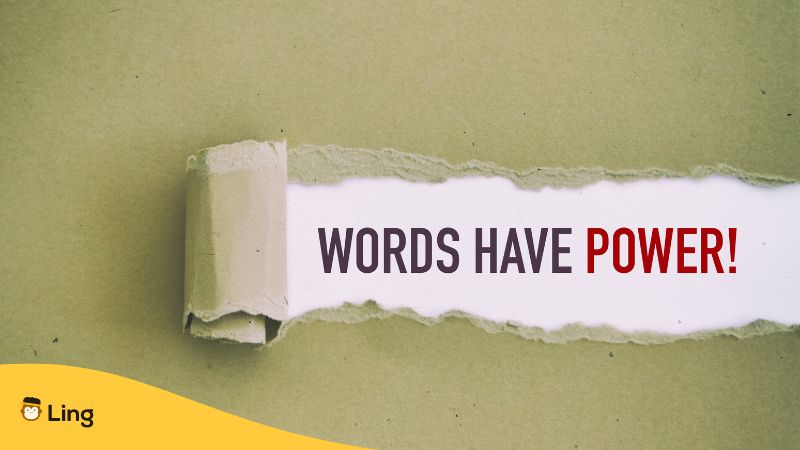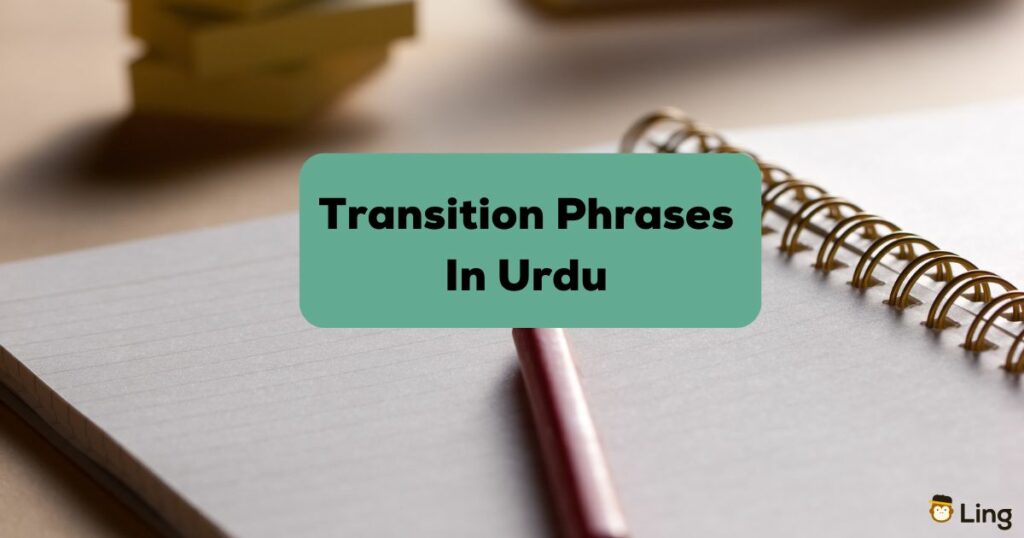Have you seen a bridge that lets passers-by cross a river easily? Transition phrases in Urdu serve a similar purpose. They link words or sentences together to ensure clear meaning. Therefore, learning about them is essential for communicating clearly and effectively.
Considering their importance, let’s look at a few common transition phrases. In this article, we’ll highlight some Urdu transition phrases with their accurate usage to let you communicate fluently and clearly.
Table Of Contents
List Of Common Transition Phrases In Urdu
Let’s begin with a list of transition phrases that natives generally use in their daily language. If you encounter Urdu writing or verbal communication, you can come across these phrases. So, let’s get started:
| English | Urdu | Roman |
|---|---|---|
| Likewise/ In the Same way/ The Same | اس طرح | Is ta-rah |
| Because | کیونکہ | Kyun ke |
| Until | جب تک | Jab tak |
| Till Then | تب تک | Tab tak |
| According to | اس کے مطابق | Is ke mutabiq |
| Hence/Thus | لہذٰا | Lihaza |
| Subsequently | اس کے بعد/ بعد آزالی | Is ke baad / baad azali |
| Initially | شروع میں | Shuru main |
| As | جیسا کہ | Jesa ke |
| Due to | کیوجہ سے | Ki wajah se |
| Moreover | اس کے علاوہ | Is ke ilawa |
| However | البتہ /تاہم | Alba’ta / taham |
| Otherwise | ورنہ | Warna |
How To Accurately Use Transition Phrases In Urdu
Transition phrases link words, sentences, and paragraphs to ensure the narrative is clearly comprehensible. For instance, imagine someone saying: “He prepared for the exam he failed” – us ne imtihan ki tyari ki thi wo fail hogaya (اُس نے امتحان کی تیاری کی تھی وہ فیل ہوگیا) instead of “He prepared for the exam, but he failed” – us ne imtihan ki tyari ki thi lekin wo fail hogaya (اُس نے امتحان کی تیاری کی تھی لیکن وہ فیل ہوگیا).
Following are some strategies to use accurate transition phrases in Urdu and link ideas smoothly, plus some example phrases.
Summarize Or Restate
In the new paragraph, summarize or restate the main point of the previous paragraph and then introduce the new one.
Example Phrases:
- In the previous paragraph – pichle paragraph main (پچھلے پیراگراف میں)
- As discussed above – jese ke upar zikar hua hai (جیسا کے اُپر ذکر ہوا ہے)
Contrast Or Compare
If you have discussed the advantages prior, start the new paragraph by making a contrast or comparison, and vice versa.
Examples:
- On the contrary – Is ke bar aks (اس کے برعکس)
- But – lekin (لیکن)
- However – taham (تاہم)
- Yet – magar (مگر)
- Although – agar che (اگرچہ)
- Otherwise – warna (ورنہ)

Add Or Continue
These are the transition phrases that denote the addition or continuation of ideas.
Examples:
- Moreover – iske ilawa (اِس کے علاوہ)
- Also – naiz (نیز)
- Firstly – pehle (پہلے)
Cause-And-Effect / Condition
Creating a cause-and-effect relationship is another effective way to show a smooth transition between ideas. It implies that a particular condition must be met to achieve the desired results.
Example Phrases:
- Since – chonka (چونکہ)
- Because – kyun ke (کیونکہ)
- Therefore – isi liye (اسی لئے)
- As – jesa ke (جیسا کہ)
Concluding
Discuss the cause in one paragraph and describe the result in the consecutive paragraph.
Example Phrases:
- Consequently/ As a result – nateejatan (نتیجتاً)
- In conclusion – akhir main (آخر میں)
- In short – mukhtasaran (مختصرً)
- Crux – aqdah (عقدہ)
Some Example Sentences Using Transition Phrases In Urdu
Now, let’s see some sentences that use transition words:
| English | Urdu | Pronunciation |
|---|---|---|
| Although technology has many advantages, it also has several disadvantages. | اگرچہ ٹیکنولوجی کے بہت سے فوائدہیں اِس کے بہت سے نقصانات بھی ہیں | Agar che technology ke bohat se fawaid hain is ke bohat se nuqsanat bhi hain. |
| We tried our best, however we were unable to convince him. | ہم نے کوشش تو بہت کی، تاہم ہم اُس کو منانے میں ناکام رہے | Hum ne koshish to bohat ki, taham hum usko manane main nakam rahe. |
| Hurry up, otherwise, we will get late. | جلدی کرو ورنہ، ہمیں دیر ہوجائے گی۔ | Jaldi karo warna hamain dair hojayegi. |
| We put up solar panels, and our neighbors did likewise. | ہم نے سولر پینل لگوائے، اور ہمارے پڑوسیوں نے بھی اسی طرح کیا۔ | Hum ne solar panel lagwaye, or hamare parosion ne bhi isi tarah kia. |
| In the previous paragraph, we studied the importance of education, and now we will talk about its practical benefits. | پچھلے پیراگراف میں, ہم نے تعلیم کی اہمیت کے بارے میں پڑھا، اب ہم اس کے عملی فوائد کے بارے میں بات کریں گے۔ | Pichle paragraph main hum ne taleem ki ehmiat ke bare main parha, ab hum is ke amli fawaid ke bare main baat karain ge. |
| As discussed above, a balanced diet is important for a healthy life. | جیسا کے اُپر ذکر ہوا ہے، صحت مند زندگی کے لئے متوازن غذا ضروری ہے | Jesa ke upar zikar kiya gaya hai, sehat mand zindagi ke liye mutawazan gaza zaroori hai. |
| Moreover, the government has also tried to improve the educational standards. | اِس کے علاوہ، حکومت نےبھی تعلیمی معیار کو بہتر کرنے کی کوشش کی ہے۔ | Is ke ilawa, hakoomat ne bhi taleemi ma’yar ko behtar karne ki koshish ki hai. |
| Also, we will talk about the benefits of advanced technology. | نیز ہم جدید ٹیکنولوجی کے فوائد کےبارے میں بات کریں گے | Naiz hum jadeed technology ke fawaid ke bare main baat karain ge. |
| Subsequently, he became the party chairman. | اُس کے بعد وہ پارٹی کا چیرمین بن گیا۔ | Uske baad wo party ka chairman ban gaya. |
| I like to go for a walk, therefore I wake up early in the morning. | مجھے چہل قدمی کرنا پسند ہے، اسی لئے میں صبح جلدی اٹھتا ہوں۔ | Mujhe chehal qadmi karna pasand hai isi liye me subah jaldi uthta hun. |
| He didn’t go to school because he wasn’t well. | وہ سکول نہیں گیا کیونکہ وہ بیمار تھا۔ | Wo school nahi gaya kyun ke wo beemar tha. |
| As Ahmed said, you can’t go anywhere. | جیسا کے احمد نے کہا، تم کہیں نہیں جاسکتی۔ | Jesa ke Ahmed ne kaha, tum kahin nahi jasakti. |
| As a result, it will be right to say that ensuring environmental safety is very important. | نتیجتاً، یہ کہنا جائز ہوگا کے ماحولیاتی تحفظ یقینی بنانا کتنا ضروری ہے۔ | Nateejatan, yeh kehna jaiz hoga ke maholiyati tahafuz yaqeeni banana kitna zaroori hai. |
| He knew he couldn’t win the match, hence he decided to withdraw. | اُس کو معلوم تھا کہ وہ یہ میچ نہیں جیت نہیں سکتا، لہذٰا اُس نے پیچھے ہٹنے کا فیصلہ کر لیا۔ | Us ko maloom tha ke wo yeh match jeet nahi sakta, lihaza us ne peeche hatne ka faisla kar lia. |
How Do You Say Transition Phrases In The Urdu Language?
The Urdu Word for ‘transition phrases’ is muntaqli fiqre (مُنتقلی فِقرے). These phrases help in drawing a smooth connection between sentences, making the conversion of ideas clear.
Other Urdu words for transition are as follows:
- To cross – aboor (عبور)
- To change/transform – tabdeeli (تبدیلی)
- Change/variation – tagayur (تغیر)
- To pass – guzar (گزر)
- To move/relocate – naqal makani (نقل مکانی)
Frequently Asked Questions About Transition Phrases In Urdu
How Good Is Urdu As A Language?
Urdu is an expressive language, having a vast range of vocabulary sourced from around 7 other languages. These languages include Persian, Arabic, Hindi, Sanskrit, Chagatai, Prakrit, and Turkish. This makes the Urdu language a beautiful blend of linguistic elements that further makes its script aesthetically appealing.
To note, “Urdu” is a Turkish word, Islamic words are from the Arabic language, basic grammar and sentence structure are similar to Hindi, and the Persian writing style is followed, that is, left to right. Plus, most words in Urdu are taken from the Persian language. In fact, several poems of Allama Iqbal, the famous Urdu poet, are in Persian.
What Is The Sentence Structure Of The Urdu Language?
The sentence structure of the Urdu language follows the SOV sequence, that is, Subject-Object-Verb. It implies that, unlike English, the object comes in the middle instead of last. For instance, we write ‘He reads books in Urdu’ as wo kitabain parhta hai (وہ کتابیں پڑھتا ہے). In this sentence, the subject is wo (وہ), the object is kitabain (کتابیں), and parhta (پڑھتا) is a verb.
What Are Slangs In Urdu?
Similar to other languages, slang is a major part of the Urdu language when it’s spoken casually. Following are examples of some Urdu slang words that natives commonly use:
- Yaar – یار – Used to call a close friend or to emphasize something.
- Jugar– جُگار – It means a quick, temporary solution to a problem
- Chill kar – چِل کر – It refers to relax or take it easy
- Patli gali se nikal jao – پتلی گلی سے نکل جاؤ – It means to quietly escape from the situation
- Tashan – ٹشن – Used to refer to style or attitude
- Panga lena – پنگا لینا – It means to pick a fight or deliberately cause trouble
However, note that not all Pakistanis use slang words. These are region-specific, so ensure that you’re using them at the right place.

Want To Explore Urdu Some More?
Learning Urdu can be intimidating at times due to the vast range of vocabulary, meanings, and especially Urdu grammar rules. In fact, there are many similar words for every word in Urdu. For instance, we can refer to transition phrases by saying muntaqli fiqre (مُنتقلی فِقرے) or intiqali alfaz (اِنتقالی الفاظ). However, learning every word is not very important.
And if you are interested in learning more Urdu language concepts, why not check out the Ling app? This app simplifies learning new languages by offering exercises, quizzes, and short lessons. With it, you can start learning any language you like and practice daily through short, interactive exercises. So, are you ready to learn Urdu or other languages with us? We would love to accompany you on your journey. Happy learning!


































































